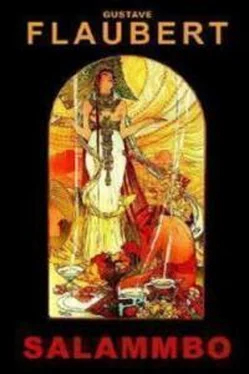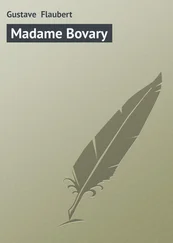Proud of having brought the Republic to submit, the Mercenaries thought that they were at last about to return to their homes with the payment for their blood in the hoods of their cloaks. But as seen through the mists of intoxication, their fatigues seemed to them prodigious and but ill–rewarded. They showed one another their wounds, they told of their combats, their travels and the hunting in their native lands. They imitated the cries and the leaps of wild beasts. Then came unclean wagers; they buried their heads in the amphoras and drank on without interruption, like thirsty dromedaries. A Lusitanian of gigantic stature ran over the tables, carrying a man in each hand at arm's length, and spitting out fire through his nostrils. Some Lacedaemonians, who had not taken off their cuirasses, were leaping with a heavy step. Some advanced like women, making obscene gestures; others stripped naked to fight amid the cups after the fashion of gladiators, and a company of Greeks danced around a vase whereon nymphs were to be seen, while a Negro tapped with an ox–bone on a brazen buckler.
Suddenly they heard a plaintive song, a song loud and soft, rising and falling in the air like the wing–beating of a wounded bird.
It was the voice of the slaves in the ergastulum. Some soldiers rose at a bound to release them and disappeared.
They returned, driving through the dust amid shouts, twenty men, distinguished by their greater paleness of face. Small black felt caps of conical shape covered their shaven heads; they all wore wooden shoes, and yet made a noise as of old iron like driving chariots.
They reached the avenue of cypress, where they were lost among the crowd of those questioning them. One of them remained apart, standing. Through the rents in his tunic his shoulders could be seen striped with long scars. Drooping his chin, he looked round him with distrust, closing his eyelids somewhat against the dazzling light of the torches, but when he saw that none of the armed men were unfriendly to him, a great sigh escaped from his breast; he stammered, he sneered through the bright tears that bathed his face. At last he seized a brimming cantharus by its rings, raised it straight up into the air with his outstretched arms, from which his chains hung down, and then looking to heaven, and still holding the cup he said:
"Hail first to thee, Baal–Eschmoun, the deliverer, whom the people of my country call Aesculapius! and to you, genii of the fountains, light, and woods! and to you, ye gods hidden beneath the mountains and in the caverns of the earth! and to you, strong men in shining armour who have set me free!"
Then he let fall the cup and related his history. He was called Spendius. The Carthaginians had taken him in the battle of Aeginusae, and he thanked the Mercenaries once more in Greek, Ligurian and Punic; he kissed their hands; finally, he congratulated them on the banquet, while expressing his surprise at not perceiving the cups of the Sacred Legion. These cups, which bore an emerald vine on each of their six golden faces, belonged to a corps composed exclusively of young patricians of the tallest stature. They were a privilege, almost a sacerdotal distinction, and accordingly nothing among the treasures of the Republic was more coveted by the Mercenaries. They detested the Legion on this account, and some of them had been known to risk their lives for the inconceivable pleasure of drinking out of these cups.
Accordingly they commanded that the cups should be brought. They were in the keeping of the Syssitia, companies of traders, who had a common table. The slaves returned. At that hour all the members of the Syssitia were asleep.
"Let them be awakened!" responded the Mercenaries.
After a second excursion it was explained to them that the cups were shut up in a temple.
"Let it be opened!" they replied.
And when the slaves confessed with trembling that they were in the possession of Gisco, the general, they cried out:
"Let him bring them!"
Gisco soon appeared at the far end of the garden with an escort of the Sacred Legion. His full, black cloak, which was fastened on his head to a golden mitre starred with precious stones, and which hung all about him down to his horse's hoofs, blended in the distance with the colour of the night. His white beard, the radiancy of his head–dress, and his triple necklace of broad blue plates beating against his breast, were alone visible.
When he entered, the soldiers greeted him with loud shouts, all crying:
"The cups! The cups!"
He began by declaring that if reference were had to their courage, they were worthy of them.
The crowd applauded and howled with joy.
HE knew it, he who had commanded them over yonder, and had returned with the last cohort in the last galley!
"True! True!" said they.
Nevertheless, Gisco continued, the Republic had respected their national divisions, their customs, and their modes of worship; in Carthage they were free! As to the cups of the Sacred Legion, they were private property. Suddenly a Gaul, who was close to Spendius, sprang over the tables and ran straight up to Gisco, gesticulating and threatening him with two naked swords.
Without interrupting his speech, the General struck him on the head with his heavy ivory staff, and the Barbarian fell. The Gauls howled, and their frenzy, which was spreading to the others, would soon have swept away the legionaries. Gisco shrugged his shoulders as he saw them growing pale. He thought that his courage would be useless against these exasperated brute beasts. It would be better to revenge himself upon them by some artifice later; accordingly, he signed to his soldiers and slowly withdrew. Then, turning in the gateway towards the Mercenaries, he cried to them that they would repent of it.
The feast recommenced. But Gisco might return, and by surrounding the suburb, which was beside the last ramparts, might crush them against the walls. Then they felt themselves alone in spite of their crowd, and the great town sleeping beneath them in the shade suddenly made them afraid, with its piles of staircases, its lofty black houses, and its vague gods fiercer even than its people. In the distance a few ships'–lanterns were gliding across the harbour, and there were lights in the temple of Khamon. They thought of Hamilcar. Where was he? Why had he forsaken them when peace was concluded? His differences with the Council were doubtless but a pretence in order to destroy them. Their unsatisfied hate recoiled upon him, and they cursed him, exasperating one another with their own anger. At this juncture they collected together beneath the plane–trees to see a slave who, with eyeballs fixed, neck contorted, and lips covered with foam, was rolling on the ground, and beating the soil with his limbs. Some one cried out that he was poisoned. All then believed themselves poisoned. They fell upon the slaves, a terrible clamour was raised, and a vertigo of destruction came like a whirlwind upon the drunken army. They struck about them at random, they smashed, they slew; some hurled torches into the foliage; others, leaning over the lions' balustrade, massacred the animals with arrows; the most daring ran to the elephants, desiring to cut down their trunks and eat ivory.
Some Balearic slingers, however, who had gone round the corner of the palace, in order to pillage more conveniently, were checked by a lofty barrier, made of Indian cane. They cut the lock–straps with their daggers, and then found themselves beneath the front that faced Carthage, in another garden full of trimmed vegetation. Lines of white flowers all following one another in regular succession formed long parabolas like star–rockets on the azure–coloured earth. The gloomy bushes exhaled warm and honied odours. There were trunks of trees smeared with cinnabar, which resembled columns covered with blood. In the centre were twelve pedestals, each supporting a great glass ball, and these hollow globes were indistinctly filled with reddish lights, like enormous and still palpitating eyeballs. The soldiers lighted themselves with torches as they stumbled on the slope of the deeply laboured soil.
Читать дальше









![Гюстав Флобер - Закат Карфагена [Сборник]](/books/414440/gyustav-flober-zakat-karfagena-sbornik-thumb.webp)
